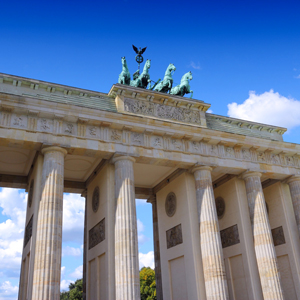GERMANY
bordered by Denmark, Poland, Czechia, France, Austria, Luxemburg, Switzerland, Belgium and the Netherlands.


German Real Estate Market
After more than four years of strong house price rises, Germany's housing market remains very strong. In a country where the housing market has historically been extraordinarily stable, this is a significant shift.
The reasons? decade-long economic growth, more than 1 million refugees, high work-related immigration, record-low unemployment, weak construction supply and low interest rates.
The German hedonic price index rose by 9.01% (7.6% inflation-adjusted) in May 2019 from a year earlier (hedonic indices attempt to compare like-for-like exactly, so are the best measure of house price trends), based on Eurospace figures. It was the highest growth since December 2016.
Roundtrip transaction costs are low to moderate at around 9.02% to 16.34% of the total price. Real estate transfer tax is levied at 3.5% to 6.5%, depending on the federal state where the property is located. Real estate agent's fee is negotiable from 3% to 6%, plus 19% VAT.

International Investment in Germany
A foreigner can legally buy and operate real estate in Germany, which, for many years, has always been a real estate option for an investor who wants to diversify his portfolio and enjoy a favourable economic trend.
The real estate market in Germany is favourable for transactions and investments for several reasons:
-
- A transparent and open system.
- The law is in favour of the owners and protects them.
- A foreigner can become owner in Germany.
- Taxation is favourable.
Our team of experts in Germany are always ready to help you facilitate the process from your home country (visa, opening of bank account, buying your own real estate properties, etc.)
The EU and the United States signed an agreement, allowing to avoid the double taxation.








